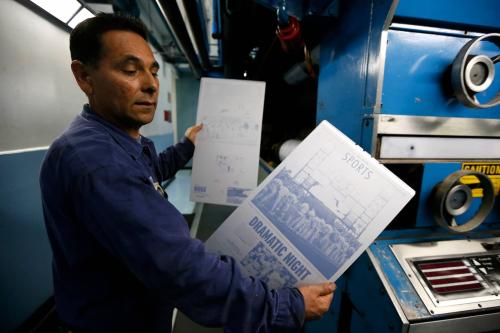The economic insecurity caused by technology-driven automation is partly to blame for growing political polarization across the United States and Europe. Over the last decade, there has been growth in populist party representation in Europe. This includes the Alternative for Germany (AfD) in Germany, Lega and the Five Star Movement (and later the Fratelli d’Italia) in Italy, Vox in Spain, Rassemblement National and La France Insoumise in France, and the Sweden Democrats in Sweden. Most of these groups have significantly increased their vote share after the 2008 economic crisis.
Social scientists have articulated many theories to explain the increases in political polarization and populism. The economic backlash theory argues that declines in real standards of living and economic opportunity have fostered frustration at the political establishment. This anger and sense of lost social status are redirected towards populist explanations and remedies—e.g., anti-immigration and cultural nostalgia. Among causes for the economic backlash thesis—outsourcing of labor, for example—the role of automation has been underexplored. This is a topic that we have previously written about and published on TechTank. And indeed, as we show in this piece, scholarship increasingly points to a link between automation and the rise of populism and political polarization in many Western countries. This populism also tends to favor the far right disproportionately.
Automation and radicalization: existing evidence
The economic insecurity caused by task automation of routine-based work is often associated with increased political polarization across Europe and the United States. A large body of evidence now exists showing that a higher risk of automation leads to increased support for populist right-wing parties. Economic uncertainty explains up to one-third of the rise in extremism in Europe, with automation playing a subsidiary role alongside other factors impacting economic livelihoods.
First, how much technology-enabled automation is occurring? And what are its economic effects? Seminal research by scholars such as David Autor, Claudia Goldin, Lawrence Katz, and David Dorn shows that since the 1980s, the United States has experienced distinct inequalities in the employment distribution, with rising shares of high-wage and low-wage work but a stagnant middle. The effects of digitalization—the diffusion of digital technology in the economy—have played a significant role in this rise of wage inequality in the U.S. Meanwhile, evidence from Kurer and Callego (2019) shows that the decrease in routine-based occupations in the U.K. is attributable to a lower intake of new workers, as most of the routine-based workers in their sample (64.5%) remain in a routine-based profession during the duration of the study, and only 3.4% of them end up unemployed.
The nature of these effects can therefore appear covert, even to workers themselves. Much of the public may attribute automation-related job displacement or skill-devaluing to other factors, such as immigration. Indeed, research by Dani Rodrik (2021) shows that cultural divergence and globalization across countries have played a significant role in growing polarization and populism. Yet he also notes that “both technology and demand shocks elicit a protectionist response…” When automation exposure is increased and perceived by workers, it can lead to calls for a slowdown of automation. Despite this, many social scientists suggest that the effects of automation on polarization are chiefly due to the threat of displacement, rather than workers’ experience of losing their job. Kurer (2020) provides evidence of this in Germany, Switzerland, and the United Kingdom. He shows that workers who lost or left their routine jobs supported left-wing parties but were between six percent and 15% more likely to abstain from the political process, reflecting disenchantment. “Survivors” of automation who maintained their jobs were more likely to vote for the populist right. This is in line with other more recent evidence suggesting that automation exposure can reduce political engagement for lower-pay workers unless they are situated in a highly unionized environment.
What should we make of the increase in polarization between automation “survivors” and those who leave their jobs? Some scholars have suggested that the observed increase in the vote share of the populist right in Europe is attributable to the fear of losing one’s social status. Kurer (2020), Im et al (2022), and Boewein et al (2024) all offer evidence that automation does indeed induce growth in voting for the populist right. The argument that automation damages workers’ perception of social status is supported by other scholarship too. Van Overbecke (2024) observes a moderating effect of wage, business policy, and contract stability—all factors linked to social status—on the relationship between automation and political polarization. Anelli et al (2021) show that the loss of social status alone doesn’t explain the effects of automation on political behavior—the broader loss of economic standing itself has a role in generating movement toward the right.
The role of the welfare state and public services
Even as automation appears to spur populist support and political polarization, the welfare state may play a powerful role as a moderator of those effects. This makes intuitive sense; if automation spurs growth in radicalism primarily through a loss of social status, public institutions and investments bent on preserving livelihoods and supporting reskilling should limit political radicalization.
Time series polling data from the European Social Survey shows that workers with higher rates of automation exposure experience increased support for redistribution policies but decreased support for social investment policies. There is no effect on the demand for universal basic income. We can see similar effects in the United States, where there is increased support for redistributing policies among those workers most exposed to automation.
Yet does redistribution play a role in reducing support for populist parties? Jane Gingrich (University of Oxford) wrote in a 2019 paper that “social programs very likely have prevented much radicalization among voters in the face of economic shocks, and pronounced fiscal austerity and direct cuts to social programs may stimulate a backlash.” She also notes that “compensatory policies are less important for how structural economic pressures play out politically in the face of automation than past forms of compensation were in the face of globalization, as affected workers face the risk of losing both income and status.”
Indeed, the Halikiopoulou and Vlandas study that Gingrich references suggests that state intervention after the 2008 crisis —such as unemployment benefits and dismissal regulations—substantially reduced the impact of unemployment on political polarization. Van Overbeke (2022), meanwhile, showed that institutionally negotiated automation aimed at redistributing the benefits of technology more fairly has a positive effect in reducing anti-incumbent voting. And so, the evidence suggests that, while social spending and redistribution can reduce the tendency of technological change to spur radicalization, the type of redistribution matters.
In particular, Halikiopoulou and Vlandas (2015) show that across Europe, when unemployment benefits are high and labor market protections are in place, there are no effects of increased unemployment on support for populism. When such institutional and social security support is weak, economic shocks result in statistically significant growth in the far right. As artificial intelligence (AI) proliferates more widely in the economy—transforming the nature of work and the quality of labor—the ability of countries to support economic adjustment will be vital to avoiding further polarization and the rise of radicalism.
The Brookings Institution is committed to quality, independence, and impact.
We are supported by a diverse array of funders. In line with our values and policies, each Brookings publication represents the sole views of its author(s).









Commentary
Does automation increase support for the far right?
A cross-country review of automation’s effects on support for populist parties
April 25, 2024